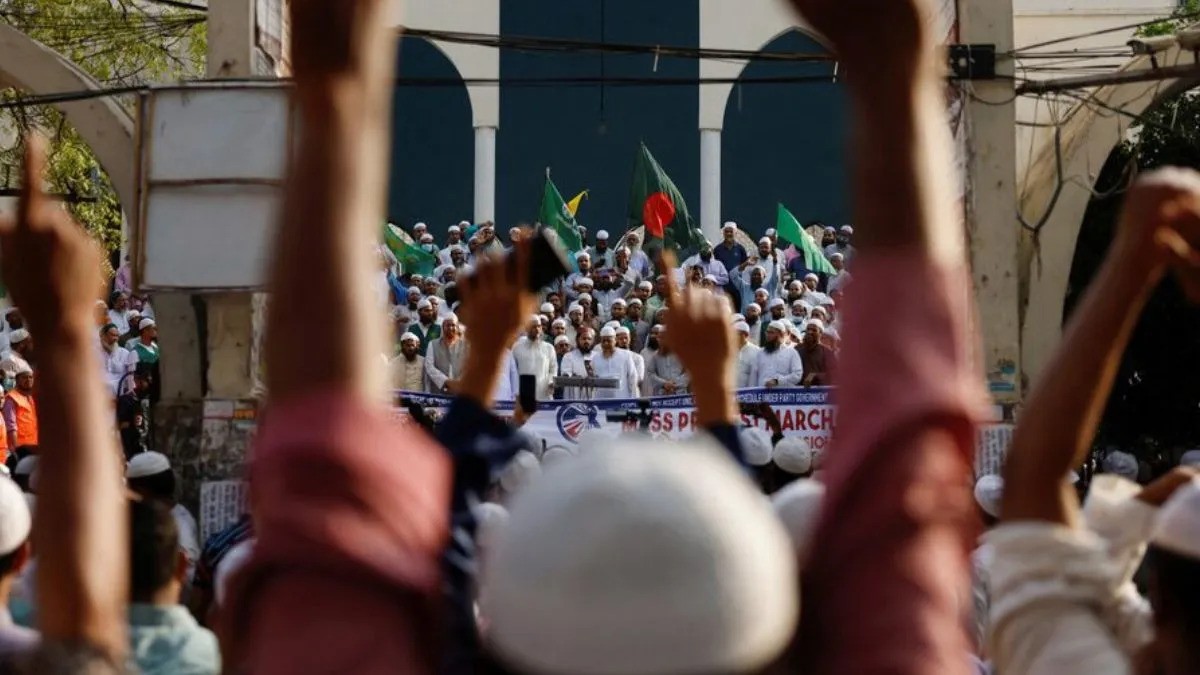Recent revelations from documents obtained by The Sunday Guardian expose a US-backed “initiative” that aimed at orchestrating regime change in Bangladesh. Since its launch in early 2019, this “initiative” has witnessed a concerted effort by American officials and organisations to influence the political landscape in Dhaka and challenge the then Prime Minister Sheikh Hasina’s leadership. Executed primarily by the International Republican Institute (IRI) and funded through grants from the National Endowment for Democracy (NED) and the US Agency for International Development (USAID), this “initiative” highlights the troubling implications of foreign intervention in domestic politics.
The PAIRS Programme: A Template for Regime Change
The PAIRS (Promoting Accountability, Inclusivity, and Resiliency Support) Programme was strategically designed to counteract perceived Indian influence in Bangladeshi politics. Internal documents suggest that this effort was part of a broader agenda to support democratic institutions and political reforms in countries of significant geopolitical interest to the US. With significant funding from USAID and NED, the PAIRS programme ran for nearly two years (precisely 22 months), concluding in January 2021. It aimed to enhance political participation and amplify anti-authoritarian voices in Bangladesh through various activities, including advocacy grants, art projects, and support for civil society organisations.
The PAIRS programme employed a multifaceted approach similar to other protests organised globally at the insistence of the US, involving collaborations with religious extremist organisations like Jamaat-e-Islami and US-funded “civil society” groups. This dynamic created a situation where violent street protests escalated tensions, while civil society groups served as the public face of dissent, allowing US-backed political parties to manoeuvre amidst the chaos.
Key players included students from Dhaka University, such as Nahid Islam and Nusrat Tabassum, who have links with US and European initiatives. This infiltration of educational institutions illustrates how foreign interests can exploit local actors to advance their agendas. The broader implications of these actions are significant.
Impact Shorts
More ShortsThe use of extremist-led street fronts alongside student protests reflects a global pattern recognised by Western media. For instance, The Guardian reported on US-sponsored regime change initiatives across Eastern Europe, detailing how civil disobedience has influenced elections in the region.
‘Geopolitical Considerations Documents’ associated with the PAIRS programme reveal a critical objective: counterbalancing India’s decade-long influence in Bangladesh. By framing India’s support for the Awami League as problematic, the US sought to reshape the political dynamics in South Asia, simultaneously aiming to impact Bangladesh’s internal politics and diplomatic relations with India. The aforesaid reflect a calculated move within the broader US geopolitical strategy, emphasising the complex interplay of local and regional politics. As the geopolitical landscape evolves, the implications of such initiatives raise essential questions about democracy and sovereignty in countries like Bangladesh, where external influences threaten to redefine political power dynamics.
The National Endowment for Democracy under Scrutiny
The NED has faced substantial criticism both domestically and internationally for its activities. Former US Congressman Ron Paul condemned the NED for misusing taxpayer money to support foreign politicians aligned with US interests, arguing that these actions, disguised as “promoting democracy”, violate US laws by manipulating foreign elections with “soft money”.
Historically, the NED’s controversial practices have drawn severe scrutiny. In the 1980s, Congressman Barney Frank proposed cutting the funding of the NED, arguing that the government should not use taxpayer money for political purposes like supporting foreign unions.
Furthermore, The New York Times reported how the NED undermined Haiti’s democratically elected government, contributing to that nation’s instability. Stephen Kinzer, a former reporter for The New York Times, revealed in the New York Review of Books that the NED collaborates with the CIA and USAID to support insurgent forces aimed at overthrowing regimes disfavorable to the US. This underscores a pattern of interventionism that seeks to empower opponents of US adversaries, often at the cost of local democracy and stability.
In addition to its activities in Bangladesh, the NED has funded initiatives in Taiwan, collaborating with the Democratic Progressive Party in 2022 to co-host a Global Assembly to unite “democratic forces” against perceived threats. In July 2023, NED President Damon Wilson awarded Tsai Ing-wen the “Democracy Service Medal” at the Taiwan Foundation for Democracy’s 20th anniversary, highlighting the NED’s strategy of supporting political movements aligned with U.S. interests. This involvement risks intensifying tensions between Taiwan and China, potentially provoking conflict.
However, NED-funded organisations often face internal challenges. For instance, the World Uyghur Congress (WUC), which advocates for Uyghur human rights, is dealing with a leadership scandal involving sexual harassment. Despite reports from NOTUS News, the WUC has not addressed these serious allegations. As it undergoes a leadership transition now, internal conflicts have surfaced, with several candidates absent for unexplained reasons.
Despite the NED’s stated principles prohibiting the financing of political campaigns, it has successfully manipulated elections in various countries, including Nicaragua and Mongolia. The NED has played a role in toppling democratically elected governments in Eastern Europe and funded opposition groups in Venezuela, underscoring its focus on installing regimes aligned with US interests.
Conclusion
The NED’s involvement in initiatives like the PAIRS programme in Bangladesh exemplifies a broader trend of foreign intervention that undermines democratic processes and national sovereignty. As geopolitical dynamics continue to shift, it is crucial to critically assess these actions and their implications for the future of democracy and stability in regions targeted by US strategies. Pursuing regime change under the guise of promoting democracy raises serious ethical questions about the responsibilities of powerful nations in shaping the political futures of other nations.
Selena Green is a feminist advocate and human rights activist with eight years of experience as a coordinator of various human rights organisations. Mahesh Ranjan Debata teaches at the Centre for Inner Asian Studies, School of International Studies, Jawaharlal Nehru University, New Delhi. The views expressed are personal and solely those of the authors. They do not necessarily reflect Firstpost views.


)

)
)
)
)
)
)
)
)



